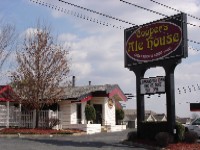NOTE: Cooper's Ale House has since relocated to 415 S Swing Road in Greensboro.
Located at 5340 West Market Street in Greensboro, Cooper’s Ale House offers appetizers, sandwiches, salads and entrees. There are daily drink specials and occasional live entertainment.
“Neighborhood sports bar” suggests a comfortably small, dark
watering hole to which regulars flock to eat wings and drink beer while
watching a game on one of a seemingly infinite number of televisions. At first
glance, Cooper’s Ale House seems to fit this conception to a T: it is dark,
wings are available, and there are many, many TVs. But looks can be deceiving,
and though Cooper’s fulfills its core purpose, it also offers more than that.
Case in point: Cooper’s is deceptively large. There are multiple
seating areas and space for plenty. The menu is also surprisingly varied (both
in terms of food and beer). You will find the bar food staples – wings,
burgers, etc. – but you can also find shrimp n grits and glazed salmon.
Sometimes, these reaches backfire, but thankfully, this was not the case.
For our first visit, my companion and I started with an
order of soft pretzels. They came out piping hot and well-salted, and the
accompanying mustard had a nice kick. Taking a gamble, I opted to follow up
with Cajun seafood pasta. It proved to be a pleasant surprise. The sauce had
the right flavor profile, and there were plenty of shrimp and crawfish pieces
mixed in. My companion went with fish n chips and found it to be one of the
better versions in the Triad. The batter was crispy, the fish inside was flaky
and salty (though not overwhelmingly so), and the fish-to-batter ratio was more
than acceptable. A side of fries was well-seasoned, but the coleslaw struck
out.
Neither pricing nor service disappointed. Our entrees were
in the $10-$13 range, a better deal than comparable dishes served elsewhere. The
food came from the kitchen fairly quickly, and our server was friendly and
helpful throughout, though she did disappear for a while as the establishment
got busier.
With its dark and dated decor, nobody will confuse Cooper’s
with being trendy. But as overpriced failures of more recent vintage have
shown, the tried and true often wins the day. And when that tried and true
manages to offer a few additional perks (in this case, better-than-expected
food), that’s all the more reason to stand pat.
8/10


